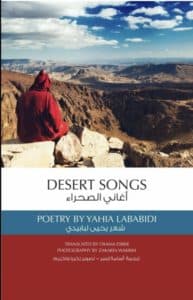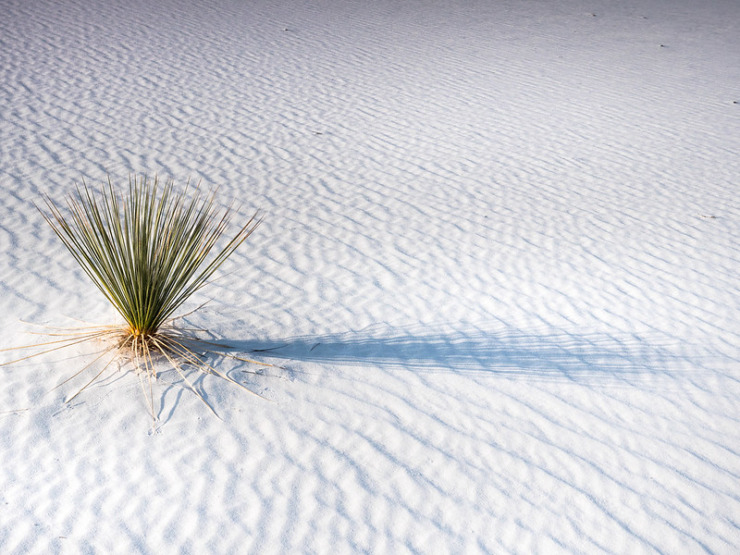Yahia Lababidi takes us on a desert pilgrimage
For millennia, the desert has been a place of both severity and serenity. Its landscape—stark, unyielding, and often brutal—entices as often as it repels. It is a place that allows life only to that which can adapt to its harsh conditions. It is this “life stripped to bare essentials” that has attracted hermits, prophets, and seers. Three of the world’s major religions—Judaism, Christianity, and Islam—began in or adjacent to a desert landscape. The Bible and the Koran are filled with desert imagery and stories.
It is the desert, writes Yahia Lababidi in the preface to his newest collection of poems, Desert Songs, that he would periodically visit to empty himself of the noise of Cairo and lose himself. He said these pilgrimages of purification and renewal were underscored by the sense that he would find a part of himself that he would not find anywhere else.
Desert Songs is a short but powerful collection. It includes six poems, in both English and Arabic, accompanied by photographs or illustrations. As you read and reread them, you realize that it may be the desert you are visiting, but Lababidi is taking you on a journey to infinity and eternity. For that is what he’s seeking here—the eternal in himself and, by extension, in each of us.
The desert, he writes in “Solitude and the Proximity to Infinite Things,” is “a cemetery / picking its teeth with bones / littered with brittle stones / marked by a grave air.” It is eternity beckoning, but it is also a place where “bearded black beetles / shuffle across sand,” not unlike the “hermits in their black robes” who have sought the desert as a place to live and a place to be.
The desert is also a place of hills and mountains, which offer a presence upon which to meditate and to ponder.
Mountain Meditation

carved from Time and Being
protruding, angular ribs
hardened, stony hearts.
Severe, austere beauty
bare, knotted musculature
intolerable masculinity.
Crooked, rotten giant teeth
a twisting sinister grin
old guards of the God
—elephantine in girth, and remembrance.
The imperishable memory of the desert
craniums exposed, crumbling horribly
a rocky backbone, desert vertebrae
spinal scales of a sleeping monster.
School of inscrutable sphinxes
master storytellers sworn to secrecy
mute, pitiless witnesses, invincible
majestic grace and menace.

Yahia Lababidi
The poems have been translated by Osama Esber, who met Lababidi via social media and adds an insightful translator’s preface to the collection. The haunting, often stark photographs accompanying the poems are by Zakaria Wakrim. They are taken from Wakrim’s “Amarg” series. Amarg is the Amazigh (or Berber) word for nostalgia and a kind of musical poetry found in southern Morocco. Many of the photographs depict a fully cloaked and hooded figure, viewed only from the rear, encountering a stark landscape of desert and rock.
Lababidi is a poet, writer, essayist, and aphorist. His poetry collections include Fever Dreams (2011), Barely There: Short Poems (2013), Balancing Acts (2016), and Learning to Pray (2021). Learning to Pray includes a section of aphorisms, a writing and philosophical form of which he is a master. Also in 2013, he published a collection of essays, Trial by Ink: From Nietzsche to Belly Dancing. A series of conversations in 2012 with his friend Alex Stern were collected as a book, The Artist as Mystic: Conversations with Yahia Lababidi. In 2020, he published a collection of aphorisms, Signposts to Elsewhere.
Desert Songs is an invitation, but it’s an invitation with a warning. You will find here a part of yourself you never knew existed. And you will find here a place where you will lose yourself. Those are its terms. Accept them, or stay away.
Related:
Yahia Lababidi and Learning to Pray
Wisdom Literature: The Aphorisms of Yahia Labbidi
Yahia Lababidi and Balancing Acts
Photo by Raychel Sanner, Creative Commons, via Flickr. Post by Glynn Young
How to Read a Poem uses images like the mouse, the hive, the switch (from the Billy Collins poem)—to guide readers into new ways of understanding poems. Anthology included.
“I require all our incoming poetry students—in the MFA I direct—to buy and read this book.”
—Jeanetta Calhoun Mish
- Longfellow’s “Paul Revere’s Ride”: Creating a National Legend - April 17, 2025
- Poets and Poems: Katie Kalisz and “Flu Season” - April 15, 2025
- Poets and Poems: Michelle Ortega and “When You Ask Me, Why Paris?” - April 10, 2025


Leave a Reply